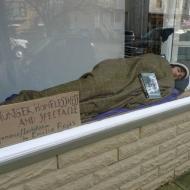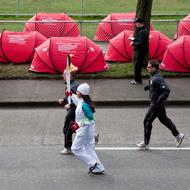Vancouver's Downtown Eastside (DTES) neighbourhood is not known as one of the city's most beautiful. Notoriously referred to as Canada's poorest postal code, the DTES has high rates of poverty, drug use, and sex work. Next to glossy Gastown, it can seem dark and ominous, viewed by many as offering little else than prowling police and a strong homeless presence.
But the community of the DTES thrives in a way that few others in the city do. Vancouver is referred to by residents and visitors alike as "No Fun City," touting strict liquor laws, few community events, and dispersed neighborhoods. The Olympic Tent Village, located at 58 W. Hastings, embodies a liveliness, spirit and sense of compassion that demonstrates the neighbourhood's resilience, dedication and innovation.





Comments
Do
Don't